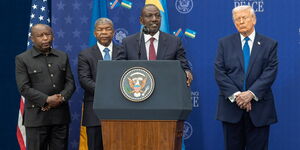Treasury Cabinet Secretary John Mbadi has outlined three reasons why the cost of living remains high for Kenyans.
According to Mbadi, high interest rates, low liquidity, and the government’s failure to clear pending bills are the key factors contributing to the high cost of living.
The explanation comes barely a month after an Infotrack survey indicated that a majority of Kenyans, 73 per cent are either in severe financial distress or struggling to make ends meet, pointing to the urgent need to correct the country’s economic situation before things go further south.
While speaking in an interview on KTN News on Wednesday, November 27, Mbadi asserted that the high cost of living has largely affected middle-class Kenyans.
According to Mbadi, at the moment, Kenyans do not have a lot of disposable income and this can be attributed to the increase in taxes last year.
“If people don’t have money in their pockets If people don’t feel they have enough money in their pocket, commodities will be seen to be high even when they are not,” asserted Mbadi.
Mbadi argued that the taxes introduced by the Finance Bill 2023, which among other things introduced new employment income tax bands, introducing 32.5 per cent and 35 per cent PAYE rates for high-income earners, is one of the policies taking money from Kenyans.
“The middle class, who are basically a majority of employed Kenyans, are finding it a little harder because of some tax measures and levies that were introduced last year and this year,” Mbadi explained.
He went on to add, “These levies and taxes have reduced the purchasing power. That is one thing we cannot run away from.”
The CS noted that the second factor affecting the high cost of living is the high interest rates. This is despite the Central Bank of Kenya (CBK) lowering the lending rate to 12 per cent in October.
High interest rates make it difficult for SMEs as well as ordinary Kenyans to access loans, thus hindering investments and business expansions. This in turn reduces the liquidity in the market.
According to Mbadi, the government is still engaging the banks, which at the moment are opting to lend to the government, to lower their lending rates. “Businesses need to borrow money from the banks and other financial institutions to invest and expand businesses, creating more employment, and these businesses will be able to inject liquidity in the market,” insists Mbadi.
The third reason why you will continue facing a high cost of living is the unpaid pending bills that, at the moment, have hit Ksh664.7 billion. This is money owed to various suppliers by government agencies.
According to Mbadi, the holding of these funds by the exchequer has slowed businesses, forcing some to close further and affecting Kenyans. The CS has revealed that the government is exploring several ways to deal with the issue, including paying the pending bills in trenches over the next three financial years.
Just a week after President Ruto noted the gap the macroeconomic indicators recorded by the Treasury and the Central Bank all show the economy is doing well, however, Kenyans are not feeling the effect.
Ruto promised, "Many struggling Kenyans impatiently wonder when real money will get to their pockets. And when will the jobs promised, which they deserve, become a reality?"












